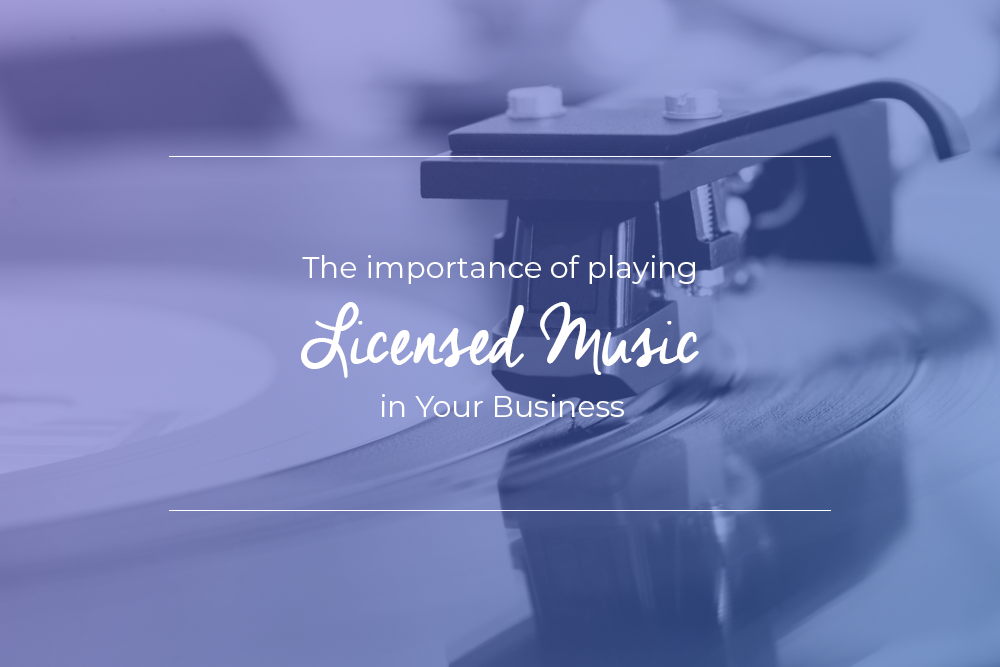
You open up shop. Turn on the lights. Start getting ready for customers, and flip on some music.
Pandora, an iPod playlist, Spotify, or maybe sounds from the television cut through the silence and fill the room with music.
And just like that — you may have put your business in a position to be sued for thousands and thousands of dollars.
Legal Requirements for Playing Music in Your Business
Music copyright law covers all methods of musical performance and play. Tadpole, a business establishment located in Tampa, Florida, hired a band to play covers like Margaritaville by Jimmy Buffett and Dirt Road Anthem by Brantley Gilbert, unknowingly offering this music to their customers illegally.
Unfortunately, ignorance is not protection against the law.
The band played popular covers, and a BMI “music researcher” took notes. Tadpole had not paid licensing fees for the songs, and the BMI representative collected the evidence.
Tadpole wasn’t aware that they were breaking any laws, until they were sued for playing copyright music. The BMI lawsuit landed Tadpole in federal court and left them with a settlement that required them to pay $30,000.
According to the story by the Tampa Bay Times, Tadpole’s owner received general notifications about music-licensing and later, correspondence directly from BMI demanding fees, but he didn’t take these requests seriously.
Even after a BMI representative showed up at the establishment, the owner didn’t understand what happened or the reasoning for the fines. He didn’t know the music-licensing laws.
“I had some lady walk in and say I owed her $3,000 for a music license,” the owner said to the Tampa Bay Times. “I don’t know where that check or money is going.”
Not knowing about music-licensing didn’t save Tadpole from the lawsuit or the repercussions that came after. Tadpole eventually closed after the settlement.
Study Music Copyright Laws to Protect Your Business
BMI isn’t out to ruin small businesses. Radio broadcasters and songwriters founded the company in 1939 to simplify the process of collecting royalties for musicians and producers.
Before BMI, royalties for music licensing had to be paid on a case-by-case business, which was tedious, complicated, and expensive. BMI centralized the process by pulling together songs that could all be covered by the same license.
The New-York based company, which is one of the three leading companies in the industry, collects royalties from music users which they distribute to their creators. Most of their revenue is distributed back to their songwriters, producers, and creators.
BMI says their mission isn’t to fight establishments through legal action. It’s to support their artists and educate businesses about the rules.
“We’re legally obligated to represent our songwriters and publishers,” said BMI vice president Dan Spears to the Tampa Bay Times. “Our goal first and foremost is to educate.”
Education is the key to protecting businesses that aren’t familiar with music-licensing laws.
The most important thing to remember: All “public performances,” which is playing music in a public place, requires licensing.
To get that licensing, you can:
-
Obtain a blanket license through BMI or its competitors ASCAP and SESAC. The cost will of the license depends on the occupancy of the establishment and can cover both live and recorded music.
-
Work with a full-service music provider who can manage licensing for you. When you hire a professional music provider like Spectrio, you’ll be completely covered as part of your service agreement. We obtain all necessary synchronization and public performance rights so you don’t need to worry about extra costs or hiring a copyright lawyer just so you can play music in your establishment.
According to the National Federation of Independent Business, there are two exceptions that allow certain small businesses to play music via radio or television without needed additional licensing.
1. Any establishment with less than 2,000 gross square feet, and any food service or drinking establishment with less than 3,750 square feet.
2. Any business establishment with greater than 2,000 square feet and any food service or drinking establishment with greater than 3,750 square feet provided they use fewer than 6 speakers or TVs, no more of 4 of which are any one room, and with a screen size of fewer than 55 inches.
These exceptions only apply if the business does not charge an admission fee nor play any other music other than terrestrial radio and TV. Pandora and Spotify do not fall under this exception.
Research to determine if you fall under these exceptions or if you need to play music from a licensed service, like Spectrio. Whatever direction you choose, take action to ensure the legality of the music in your business.
Ignoring music-licensing laws and claiming ignorance will not protect you from potential lawsuits from companies like BMI.
- Can I Play Music Purchased Online as Overhead Music?
- Am I Allowed to Stream Pandora or Spotify in My Store?
- How Can I Avoid Fines When Playing Music at My Business?
Or if you are ready to do an audit on the music situation at your establishment and make sure you are acting within the law, contact us.
Spectrio will provide a free consultation to educate you on music-licensing so you don’t get sued for playing copyright music.
Secure your business and contact us today to schedule your free music-licensing consultation.